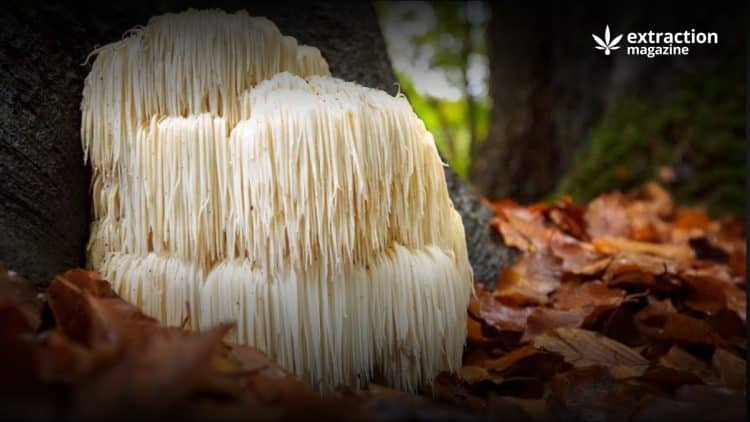According to recent data, it is believed that the global mushroom market is expected to grow by about 10% annually until 2030, with it already valued at an astonishing $50.3 billion. One of the more popular mushrooms making waves currently and contributing to these profits is lion’s mane.
In recent years lions’ mane or Hericium erinaceus, as it is scientifically known, is a mushroom that has become immensely popular among the old and young. It’s often consumed in supplement and tincture form after properties have been extracted from it or in teas and soups.
Yet, despite its popularity, not many people know much about lion’s mane and its purported benefits in humans. In our article, we’ve discussed everything you should know about lion’s mane extract, including what it is, its reported benefits, its side effects, and recommended dosages.
What Is Lion’s Mane Extract?
Lion’s mane powders, tinctures, and supplements all have extracts of the lion’s mane mushroom. Yet, what is a lion’s mane? According to historians, lion’s mane is a mushroom with a rich history since it’s been used in culinary and medicinal practices in Asia and Europe for centuries.
This mushroom typically grows on old or dead broadleaf tree trunks in summer and fall. It is relatively rare to find, especially if you live in areas besides Canada and North America.
Although lion’s mane mushrooms are hard to find in the wild, you can grow them at home with the right tools and growing conditions. This mushroom type is characterized by its visible fruiting body that resembles a ‘lion’s mane’ and its mycelium structure that resembles roots.
Scientists have been studying this mushroom for years, and many interesting studies have been released surrounding its presumed health benefits in humans.
What Are Three Promising Benefits Of Lion’s Mane Extract?
With lion’s mane extracts seeing an uptick in interest, it’s important to stay abreast of why so many individuals are considering trying this fungus or have already added it to their daily regime.
1 It Could Protect Against Alzheimer’s And Dementia
Many people know that as we age, our brain’s ability to form new connections declines, which is why it’s believed mental functioning worsens in older adults leading to conditions like Alzheimer’s and dementia.
One of the most promising developments to prevent this is to take lion’s mane extract to protect against these mental diseases. Recent studies on humans and animals have shown that lion’s mane mushrooms contain two crucial compounds – hericenones and erinacines – that stimulate brain cell growth.
For example, Animal studies in mice have shown that lion’s mane extracts have reduced the symptoms of memory loss alongside preventing neuronal damage by amyloid-beta plaques that accumulate in the brain of those with Alzheimer’s.
Additionally, a 2020 study found that 1 gram of lion’s mane mushroom over 49 weeks improved cognitive test scores in individuals with Alzheimer’s disease compared with those who had taken a placebo.
Thus, it’s speculated that lion’s mane extract has beneficial effects on the brain because it promotes nerve growth and protects against Alzheimer-related damage. Yet, most studies on this topic have been completed on animals, so more research is required.
2. It Could Assist With Anxiety And Depression
In the United States, it is believed that an estimated 31.1% of adults experience an anxiety disorder during their lifetime. In addition, according to the World Health Organization, depression affects 5% of the global population.
One of the latest treatment ideas for those suffering from depression and anxiety is lion’s mane because it could benefit patients, according to numerous studies.
For example, a study on mice revealed that those who had consumed a lion’s mane extract displayed fewer depressive behaviors. Additionally, these mice also had blood markers that indicated lower depression.
Moreover, another study conducted on animals in 2018 supported this theory that lion’s mane mushrooms contain compounds that could be useful in treating these conditions in humans.
Although this fungus isn’t currently being used to assist with depression and anxiety, it could become a viable treatment option in the coming years with more research conducted on the topic.
3. It Could Help Fight Cancer
Despite how far-fetched it might seem, studies suggest lion’s mane could help fight cancer. One 2011 study highlighted the fact that lion’s mane extract could help eliminate leukemia cells.
Additionally, another animal study revealed that lion’s mane extract effectively reduced the size of colon tumors in mice.
Due to this achievement, researchers of this study suggest that this mushroom could fight-off colon cancer because it increases the activity of select cells involved in an individual’s immune response.
Yet, despite these promising findings, it’s too soon to say that this mushroom has cancer-fighting properties in human treatment.
What Are The Side Effects of Lion’s Mane Extract?
For the most part of scientific studies, it has been deduced that lion’s mane extract is safe in humans. Most people cite a popular study involving rats as the reason this extract is safe.
For example, during the study, none of the rats given lion’s mane, even at doses as high as 2.3 grams per pound, showed signs of adverse effects. These rats were administered doses for three months, and it proved harmless.
Before deciding to take lion’s mane extract, it’s a good idea to speak with your doctor first. This is especially true for those allergic or sensitive to mushrooms, as those with allergies cannot consume lion’s mane.
Those who are allergic have reported difficulty breathing and skin rashes after exposure to this fungus, so keep this in mind.
Recommended Dosages
There is no standard dose requirement for lion’s mane extract because how much you take depends on your age, gender, weight, and health. This means you will need to speak with a doctor to determine how much you should take every day and for how long.
However, even though there is no standard dosage, there are some recommended dosages. For example, some researchers recommend individuals (adults) take three to five grams daily to improve cognition.
In addition, others have recommended taking three 400-milligram capsules every day over eight weeks to assist overweight individuals with sleep disorders, depression, and anxiety.
Wrap-Up On Lion’s Mane Extract
Evidently, lion’s mane extract has been shown to have various health benefits in animals but few in humans.
Research has found that lion’s mane might potentially protect against dementia and Alzheimer’s and could assist with relieving symptoms associated with depression and anxiety and fighting cancer – among other things.
More studies involving humans should be done and completed before practical health applications for this fungus can commence.











